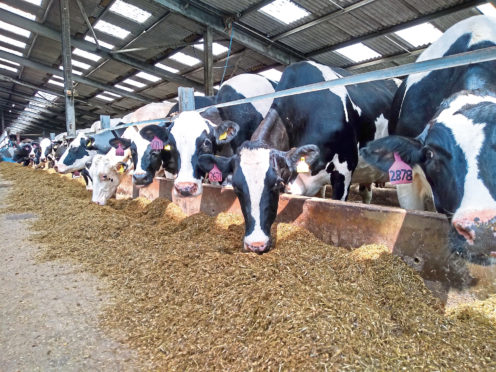Dairy farmers are being encouraged to consider a move away from feeding soya to their cattle following trials into alternative proteins on three Scottish dairy farms.
Scotland’s Rural College (SRUC) has removed soya from the rations fed to three of its dairy herds and analysed the impact of protein alternatives, such as rapemeal and distillers’ wheat dark grains, on their productivity.
The three herds, all based in Dumfries and Galloway, are the 200-cow Langhill research herd at SRUC’s Crichton Royal Farm, the 210-cow Acrehead herd and the 200-cow herd based at SRUC’s Barony Campus.
Lorna MacPherson, a dairy consultant with SAC Consulting, which is part of SRUC, said Marks & Spencer had banned the use of soya in its milk production and other retailers may do the same.
“Farmers shouldn’t be afraid of not using soya in their rations,” she said.
“The SRUC dairy farms stopped feeding soya in the total mixed ration to both milking and dry cows in April this year, with new diets formulated with more rapemeal and distillers wheat dark grains, with protected rapemeal added to provide quality bypass protein.
“We monitored output over three months, with our data showing there wasn’t much change in milk output or milk composition after excluding soya from their diet.”
She said three rations were reformulated without soya and designed to have the same level of protein, bypass protein and energy content as soya-based blends.
“Although both conventional and protected rapemeal are cheaper per tonne, farmers will have to feed more of these alternatives to reach the same protein content in the diet when replacing soya,” added Ms MacPherson.
“A downside is that this means there is less space in the ration to use your own forage or cereals – in some sense, soya is a space saver.”
She said not all soya production was bad, but a growing environmental lobby and bold ambitions from retailers mean growing soya alternatives may offer opportunity for farmers in Scotland.
